Comparative Analysis: Audit Rotation in UK and Australian Regulations
VerifiedAdded on 2023/06/03
|7
|1674
|426
Case Study
AI Summary
This case study examines the requirements for audit rotation in the UK Corporate Governance Code and the Australian Corporations Act. It compares the two approaches, focusing on auditor independence and audit quality. The analysis explores the advantages and disadvantages of each system, considering the impact of audit firm and partner rotation on financial audits. The study references relevant literature to support its arguments and provides insights into how these regulations aim to strengthen auditor independence and improve audit outcomes. The conclusion emphasizes that understanding the needs of the auditors can prevent frauds, and the rotation of auditors is a more work for the management.
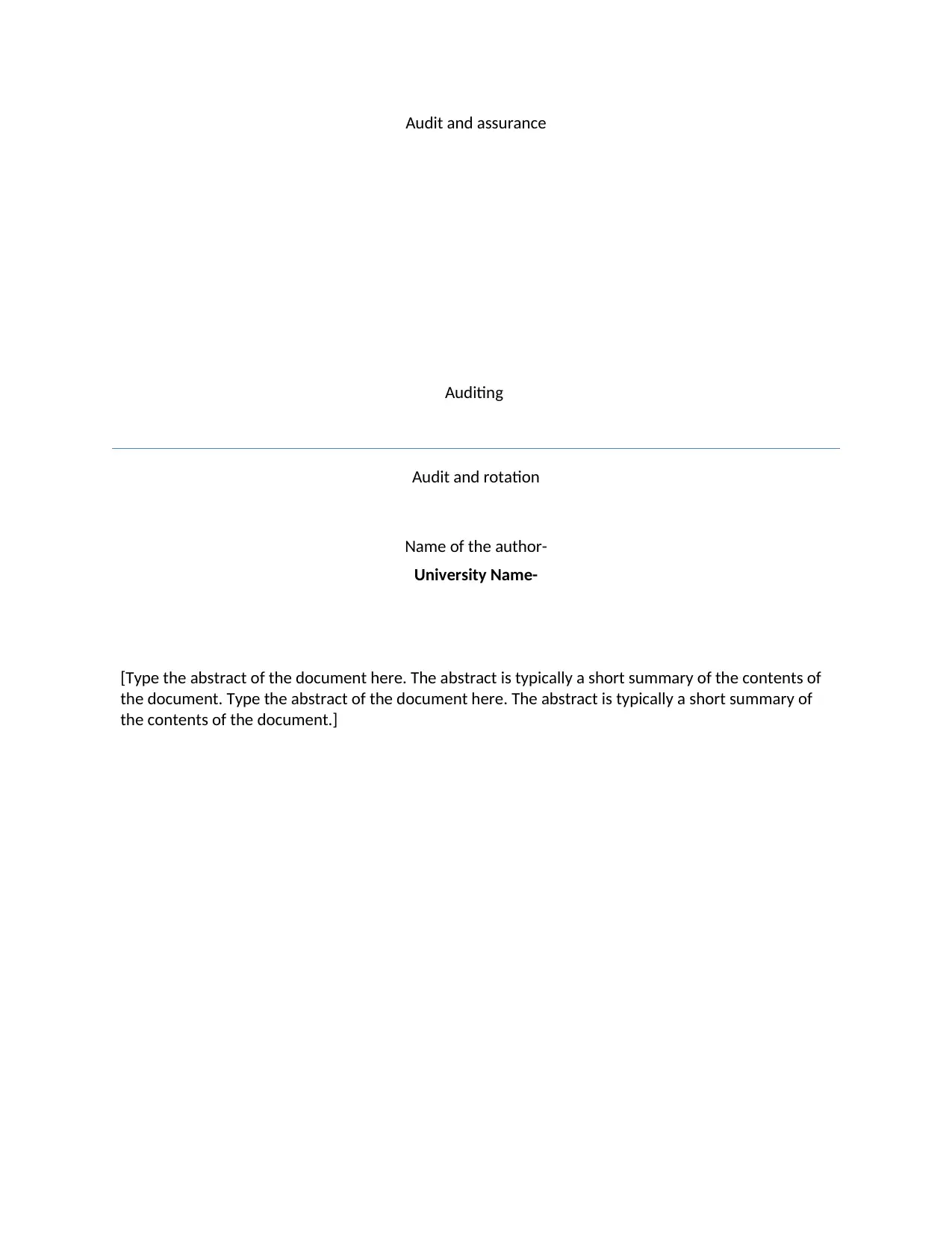
Audit and assurance
Auditing
Audit and rotation
Name of the author-
University Name-
[Type the abstract of the document here. The abstract is typically a short summary of the contents of
the document. Type the abstract of the document here. The abstract is typically a short summary of
the contents of the document.]
Auditing
Audit and rotation
Name of the author-
University Name-
[Type the abstract of the document here. The abstract is typically a short summary of the contents of
the document. Type the abstract of the document here. The abstract is typically a short summary of
the contents of the document.]
Paraphrase This Document
Need a fresh take? Get an instant paraphrase of this document with our AI Paraphraser
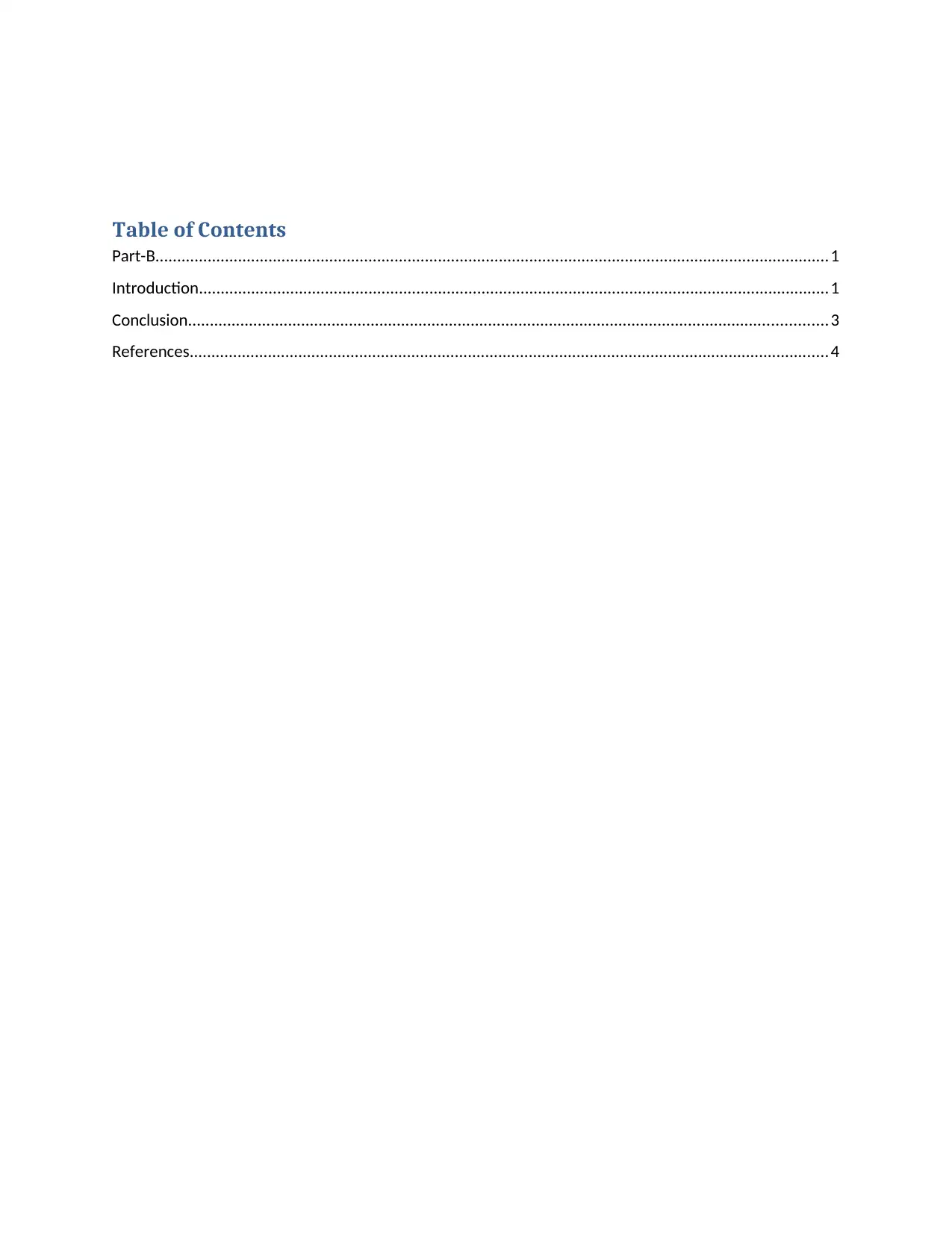
Table of Contents
Part-B...........................................................................................................................................................1
Introduction.................................................................................................................................................1
Conclusion...................................................................................................................................................3
References...................................................................................................................................................4
Part-B...........................................................................................................................................................1
Introduction.................................................................................................................................................1
Conclusion...................................................................................................................................................3
References...................................................................................................................................................4
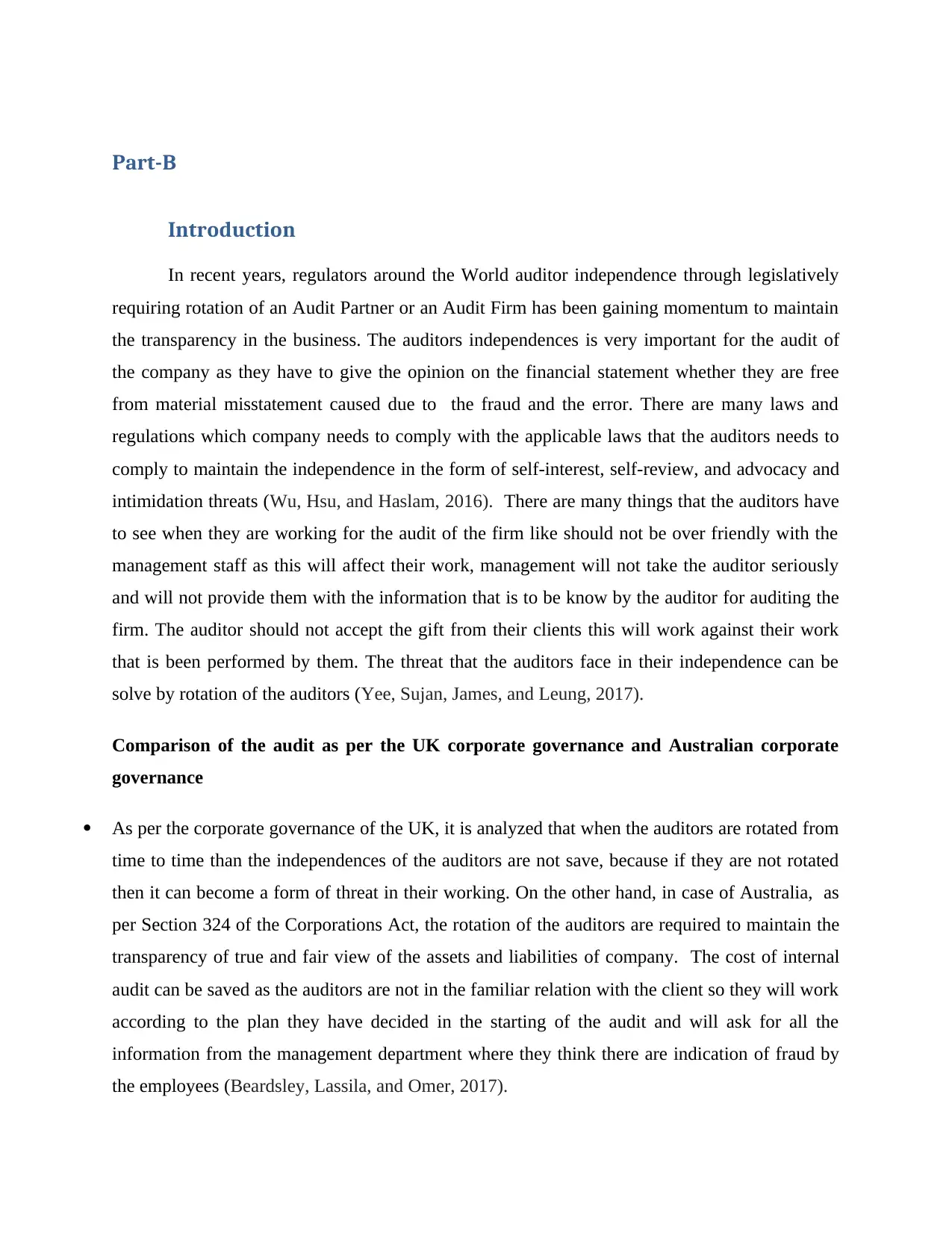
Part-B
Introduction
In recent years, regulators around the World auditor independence through legislatively
requiring rotation of an Audit Partner or an Audit Firm has been gaining momentum to maintain
the transparency in the business. The auditors independences is very important for the audit of
the company as they have to give the opinion on the financial statement whether they are free
from material misstatement caused due to the fraud and the error. There are many laws and
regulations which company needs to comply with the applicable laws that the auditors needs to
comply to maintain the independence in the form of self-interest, self-review, and advocacy and
intimidation threats (Wu, Hsu, and Haslam, 2016). There are many things that the auditors have
to see when they are working for the audit of the firm like should not be over friendly with the
management staff as this will affect their work, management will not take the auditor seriously
and will not provide them with the information that is to be know by the auditor for auditing the
firm. The auditor should not accept the gift from their clients this will work against their work
that is been performed by them. The threat that the auditors face in their independence can be
solve by rotation of the auditors (Yee, Sujan, James, and Leung, 2017).
Comparison of the audit as per the UK corporate governance and Australian corporate
governance
As per the corporate governance of the UK, it is analyzed that when the auditors are rotated from
time to time than the independences of the auditors are not save, because if they are not rotated
then it can become a form of threat in their working. On the other hand, in case of Australia, as
per Section 324 of the Corporations Act, the rotation of the auditors are required to maintain the
transparency of true and fair view of the assets and liabilities of company. The cost of internal
audit can be saved as the auditors are not in the familiar relation with the client so they will work
according to the plan they have decided in the starting of the audit and will ask for all the
information from the management department where they think there are indication of fraud by
the employees (Beardsley, Lassila, and Omer, 2017).
Introduction
In recent years, regulators around the World auditor independence through legislatively
requiring rotation of an Audit Partner or an Audit Firm has been gaining momentum to maintain
the transparency in the business. The auditors independences is very important for the audit of
the company as they have to give the opinion on the financial statement whether they are free
from material misstatement caused due to the fraud and the error. There are many laws and
regulations which company needs to comply with the applicable laws that the auditors needs to
comply to maintain the independence in the form of self-interest, self-review, and advocacy and
intimidation threats (Wu, Hsu, and Haslam, 2016). There are many things that the auditors have
to see when they are working for the audit of the firm like should not be over friendly with the
management staff as this will affect their work, management will not take the auditor seriously
and will not provide them with the information that is to be know by the auditor for auditing the
firm. The auditor should not accept the gift from their clients this will work against their work
that is been performed by them. The threat that the auditors face in their independence can be
solve by rotation of the auditors (Yee, Sujan, James, and Leung, 2017).
Comparison of the audit as per the UK corporate governance and Australian corporate
governance
As per the corporate governance of the UK, it is analyzed that when the auditors are rotated from
time to time than the independences of the auditors are not save, because if they are not rotated
then it can become a form of threat in their working. On the other hand, in case of Australia, as
per Section 324 of the Corporations Act, the rotation of the auditors are required to maintain the
transparency of true and fair view of the assets and liabilities of company. The cost of internal
audit can be saved as the auditors are not in the familiar relation with the client so they will work
according to the plan they have decided in the starting of the audit and will ask for all the
information from the management department where they think there are indication of fraud by
the employees (Beardsley, Lassila, and Omer, 2017).
⊘ This is a preview!⊘
Do you want full access?
Subscribe today to unlock all pages.

Trusted by 1+ million students worldwide
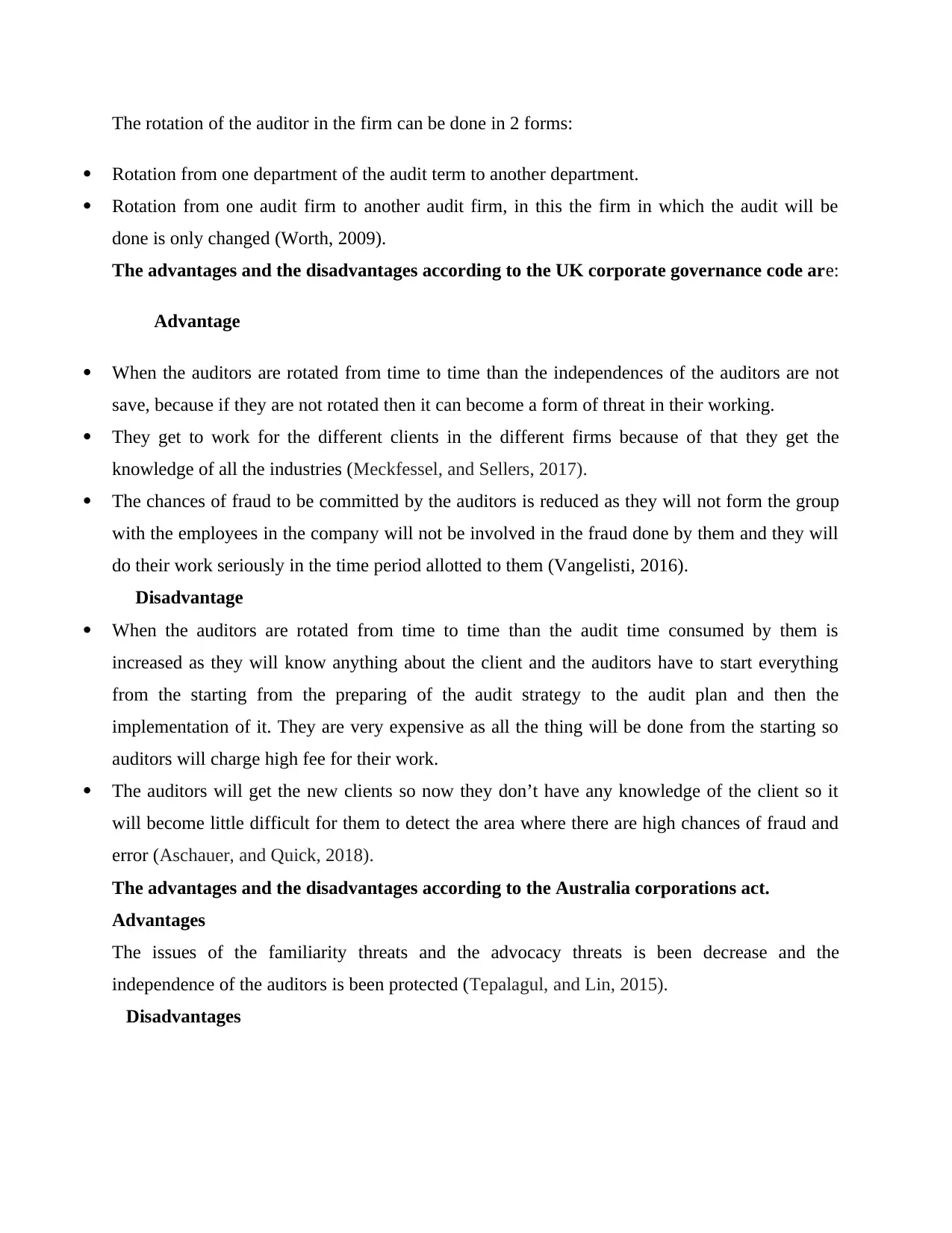
The rotation of the auditor in the firm can be done in 2 forms:
Rotation from one department of the audit term to another department.
Rotation from one audit firm to another audit firm, in this the firm in which the audit will be
done is only changed (Worth, 2009).
The advantages and the disadvantages according to the UK corporate governance code are:
Advantage
When the auditors are rotated from time to time than the independences of the auditors are not
save, because if they are not rotated then it can become a form of threat in their working.
They get to work for the different clients in the different firms because of that they get the
knowledge of all the industries (Meckfessel, and Sellers, 2017).
The chances of fraud to be committed by the auditors is reduced as they will not form the group
with the employees in the company will not be involved in the fraud done by them and they will
do their work seriously in the time period allotted to them (Vangelisti, 2016).
Disadvantage
When the auditors are rotated from time to time than the audit time consumed by them is
increased as they will know anything about the client and the auditors have to start everything
from the starting from the preparing of the audit strategy to the audit plan and then the
implementation of it. They are very expensive as all the thing will be done from the starting so
auditors will charge high fee for their work.
The auditors will get the new clients so now they don’t have any knowledge of the client so it
will become little difficult for them to detect the area where there are high chances of fraud and
error (Aschauer, and Quick, 2018).
The advantages and the disadvantages according to the Australia corporations act.
Advantages
The issues of the familiarity threats and the advocacy threats is been decrease and the
independence of the auditors is been protected (Tepalagul, and Lin, 2015).
Disadvantages
Rotation from one department of the audit term to another department.
Rotation from one audit firm to another audit firm, in this the firm in which the audit will be
done is only changed (Worth, 2009).
The advantages and the disadvantages according to the UK corporate governance code are:
Advantage
When the auditors are rotated from time to time than the independences of the auditors are not
save, because if they are not rotated then it can become a form of threat in their working.
They get to work for the different clients in the different firms because of that they get the
knowledge of all the industries (Meckfessel, and Sellers, 2017).
The chances of fraud to be committed by the auditors is reduced as they will not form the group
with the employees in the company will not be involved in the fraud done by them and they will
do their work seriously in the time period allotted to them (Vangelisti, 2016).
Disadvantage
When the auditors are rotated from time to time than the audit time consumed by them is
increased as they will know anything about the client and the auditors have to start everything
from the starting from the preparing of the audit strategy to the audit plan and then the
implementation of it. They are very expensive as all the thing will be done from the starting so
auditors will charge high fee for their work.
The auditors will get the new clients so now they don’t have any knowledge of the client so it
will become little difficult for them to detect the area where there are high chances of fraud and
error (Aschauer, and Quick, 2018).
The advantages and the disadvantages according to the Australia corporations act.
Advantages
The issues of the familiarity threats and the advocacy threats is been decrease and the
independence of the auditors is been protected (Tepalagul, and Lin, 2015).
Disadvantages
Paraphrase This Document
Need a fresh take? Get an instant paraphrase of this document with our AI Paraphraser
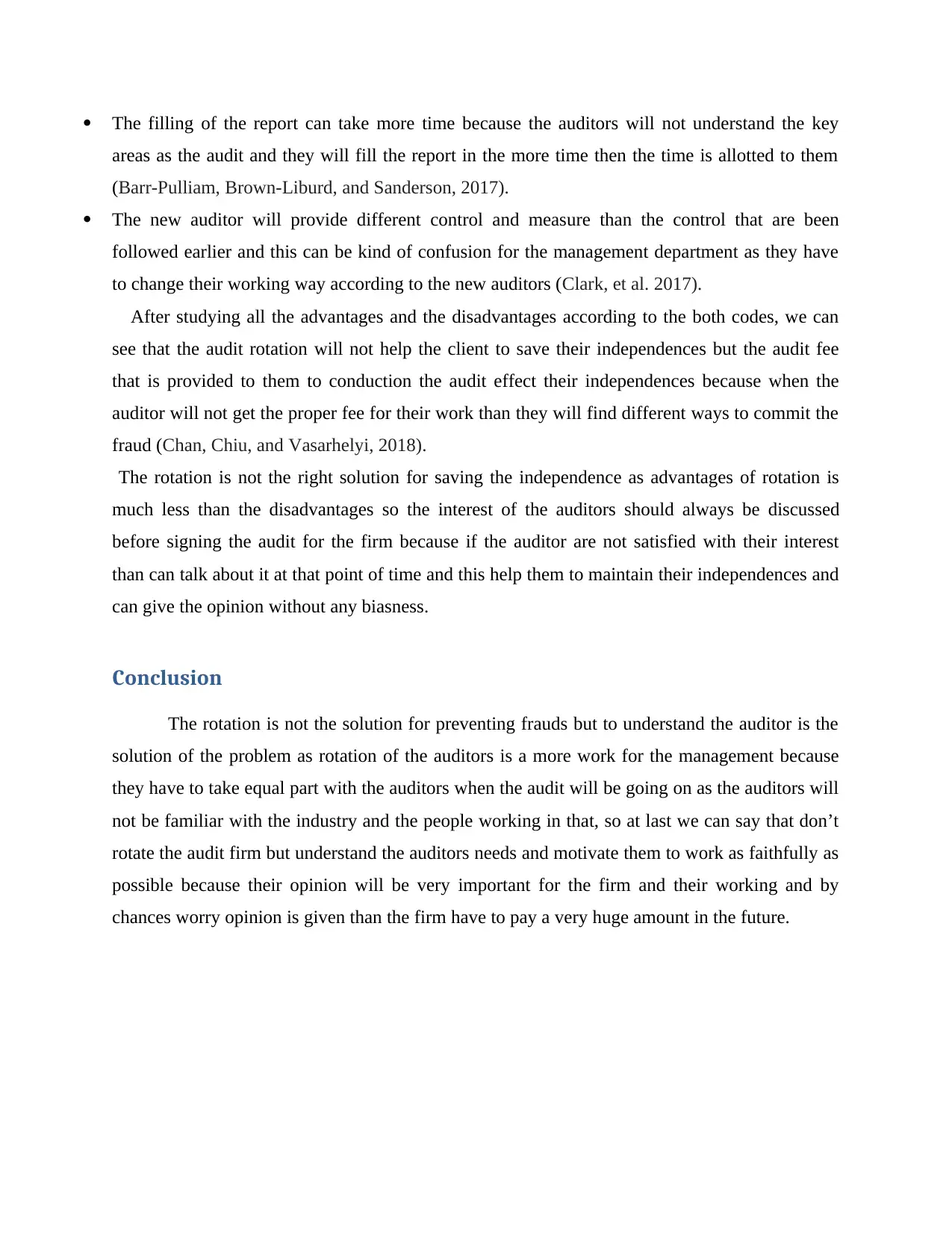
The filling of the report can take more time because the auditors will not understand the key
areas as the audit and they will fill the report in the more time then the time is allotted to them
(Barr-Pulliam, Brown-Liburd, and Sanderson, 2017).
The new auditor will provide different control and measure than the control that are been
followed earlier and this can be kind of confusion for the management department as they have
to change their working way according to the new auditors (Clark, et al. 2017).
After studying all the advantages and the disadvantages according to the both codes, we can
see that the audit rotation will not help the client to save their independences but the audit fee
that is provided to them to conduction the audit effect their independences because when the
auditor will not get the proper fee for their work than they will find different ways to commit the
fraud (Chan, Chiu, and Vasarhelyi, 2018).
The rotation is not the right solution for saving the independence as advantages of rotation is
much less than the disadvantages so the interest of the auditors should always be discussed
before signing the audit for the firm because if the auditor are not satisfied with their interest
than can talk about it at that point of time and this help them to maintain their independences and
can give the opinion without any biasness.
Conclusion
The rotation is not the solution for preventing frauds but to understand the auditor is the
solution of the problem as rotation of the auditors is a more work for the management because
they have to take equal part with the auditors when the audit will be going on as the auditors will
not be familiar with the industry and the people working in that, so at last we can say that don’t
rotate the audit firm but understand the auditors needs and motivate them to work as faithfully as
possible because their opinion will be very important for the firm and their working and by
chances worry opinion is given than the firm have to pay a very huge amount in the future.
areas as the audit and they will fill the report in the more time then the time is allotted to them
(Barr-Pulliam, Brown-Liburd, and Sanderson, 2017).
The new auditor will provide different control and measure than the control that are been
followed earlier and this can be kind of confusion for the management department as they have
to change their working way according to the new auditors (Clark, et al. 2017).
After studying all the advantages and the disadvantages according to the both codes, we can
see that the audit rotation will not help the client to save their independences but the audit fee
that is provided to them to conduction the audit effect their independences because when the
auditor will not get the proper fee for their work than they will find different ways to commit the
fraud (Chan, Chiu, and Vasarhelyi, 2018).
The rotation is not the right solution for saving the independence as advantages of rotation is
much less than the disadvantages so the interest of the auditors should always be discussed
before signing the audit for the firm because if the auditor are not satisfied with their interest
than can talk about it at that point of time and this help them to maintain their independences and
can give the opinion without any biasness.
Conclusion
The rotation is not the solution for preventing frauds but to understand the auditor is the
solution of the problem as rotation of the auditors is a more work for the management because
they have to take equal part with the auditors when the audit will be going on as the auditors will
not be familiar with the industry and the people working in that, so at last we can say that don’t
rotate the audit firm but understand the auditors needs and motivate them to work as faithfully as
possible because their opinion will be very important for the firm and their working and by
chances worry opinion is given than the firm have to pay a very huge amount in the future.
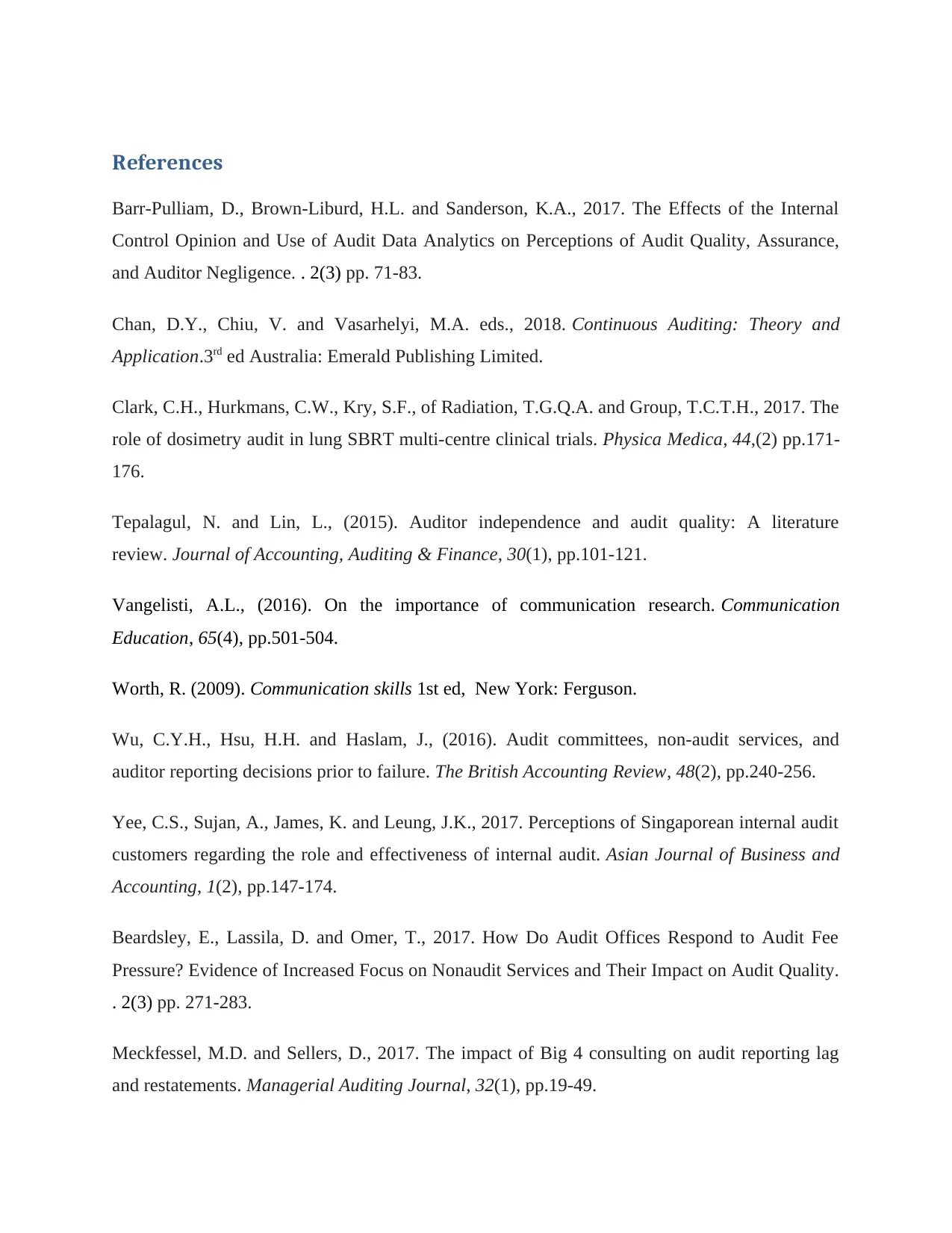
References
Barr-Pulliam, D., Brown-Liburd, H.L. and Sanderson, K.A., 2017. The Effects of the Internal
Control Opinion and Use of Audit Data Analytics on Perceptions of Audit Quality, Assurance,
and Auditor Negligence. . 2(3) pp. 71-83.
Chan, D.Y., Chiu, V. and Vasarhelyi, M.A. eds., 2018. Continuous Auditing: Theory and
Application.3rd ed Australia: Emerald Publishing Limited.
Clark, C.H., Hurkmans, C.W., Kry, S.F., of Radiation, T.G.Q.A. and Group, T.C.T.H., 2017. The
role of dosimetry audit in lung SBRT multi-centre clinical trials. Physica Medica, 44,(2) pp.171-
176.
Tepalagul, N. and Lin, L., (2015). Auditor independence and audit quality: A literature
review. Journal of Accounting, Auditing & Finance, 30(1), pp.101-121.
Vangelisti, A.L., (2016). On the importance of communication research. Communication
Education, 65(4), pp.501-504.
Worth, R. (2009). Communication skills 1st ed, New York: Ferguson.
Wu, C.Y.H., Hsu, H.H. and Haslam, J., (2016). Audit committees, non-audit services, and
auditor reporting decisions prior to failure. The British Accounting Review, 48(2), pp.240-256.
Yee, C.S., Sujan, A., James, K. and Leung, J.K., 2017. Perceptions of Singaporean internal audit
customers regarding the role and effectiveness of internal audit. Asian Journal of Business and
Accounting, 1(2), pp.147-174.
Beardsley, E., Lassila, D. and Omer, T., 2017. How Do Audit Offices Respond to Audit Fee
Pressure? Evidence of Increased Focus on Nonaudit Services and Their Impact on Audit Quality.
. 2(3) pp. 271-283.
Meckfessel, M.D. and Sellers, D., 2017. The impact of Big 4 consulting on audit reporting lag
and restatements. Managerial Auditing Journal, 32(1), pp.19-49.
Barr-Pulliam, D., Brown-Liburd, H.L. and Sanderson, K.A., 2017. The Effects of the Internal
Control Opinion and Use of Audit Data Analytics on Perceptions of Audit Quality, Assurance,
and Auditor Negligence. . 2(3) pp. 71-83.
Chan, D.Y., Chiu, V. and Vasarhelyi, M.A. eds., 2018. Continuous Auditing: Theory and
Application.3rd ed Australia: Emerald Publishing Limited.
Clark, C.H., Hurkmans, C.W., Kry, S.F., of Radiation, T.G.Q.A. and Group, T.C.T.H., 2017. The
role of dosimetry audit in lung SBRT multi-centre clinical trials. Physica Medica, 44,(2) pp.171-
176.
Tepalagul, N. and Lin, L., (2015). Auditor independence and audit quality: A literature
review. Journal of Accounting, Auditing & Finance, 30(1), pp.101-121.
Vangelisti, A.L., (2016). On the importance of communication research. Communication
Education, 65(4), pp.501-504.
Worth, R. (2009). Communication skills 1st ed, New York: Ferguson.
Wu, C.Y.H., Hsu, H.H. and Haslam, J., (2016). Audit committees, non-audit services, and
auditor reporting decisions prior to failure. The British Accounting Review, 48(2), pp.240-256.
Yee, C.S., Sujan, A., James, K. and Leung, J.K., 2017. Perceptions of Singaporean internal audit
customers regarding the role and effectiveness of internal audit. Asian Journal of Business and
Accounting, 1(2), pp.147-174.
Beardsley, E., Lassila, D. and Omer, T., 2017. How Do Audit Offices Respond to Audit Fee
Pressure? Evidence of Increased Focus on Nonaudit Services and Their Impact on Audit Quality.
. 2(3) pp. 271-283.
Meckfessel, M.D. and Sellers, D., 2017. The impact of Big 4 consulting on audit reporting lag
and restatements. Managerial Auditing Journal, 32(1), pp.19-49.
⊘ This is a preview!⊘
Do you want full access?
Subscribe today to unlock all pages.

Trusted by 1+ million students worldwide
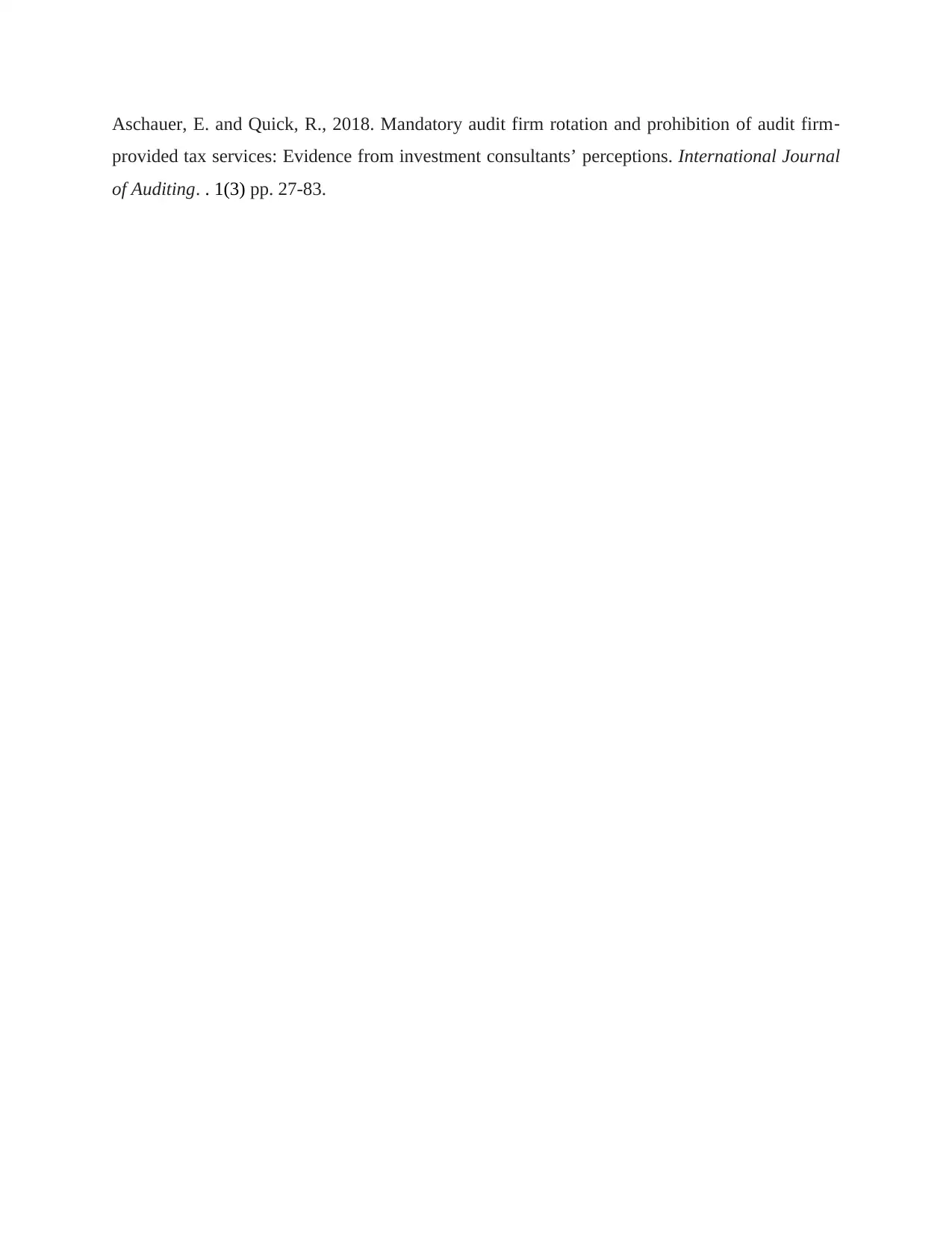
Aschauer, E. and Quick, R., 2018. Mandatory audit firm rotation and prohibition of audit firm‐
provided tax services: Evidence from investment consultants’ perceptions. International Journal
of Auditing. . 1(3) pp. 27-83.
provided tax services: Evidence from investment consultants’ perceptions. International Journal
of Auditing. . 1(3) pp. 27-83.
1 out of 7
Related Documents
Your All-in-One AI-Powered Toolkit for Academic Success.
+13062052269
info@desklib.com
Available 24*7 on WhatsApp / Email
![[object Object]](/_next/static/media/star-bottom.7253800d.svg)
Unlock your academic potential
Copyright © 2020–2025 A2Z Services. All Rights Reserved. Developed and managed by ZUCOL.



